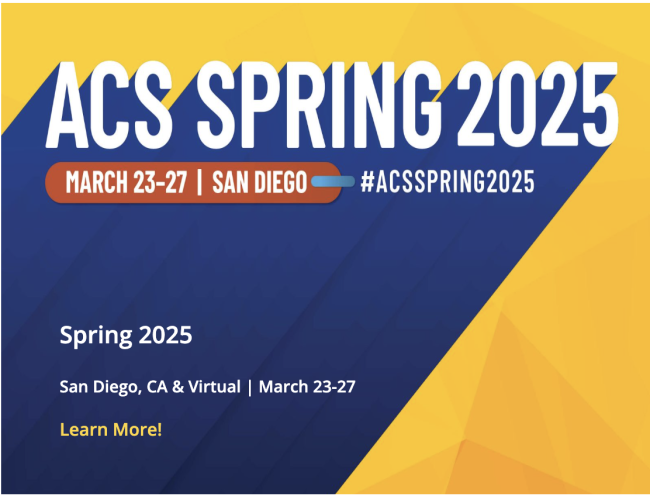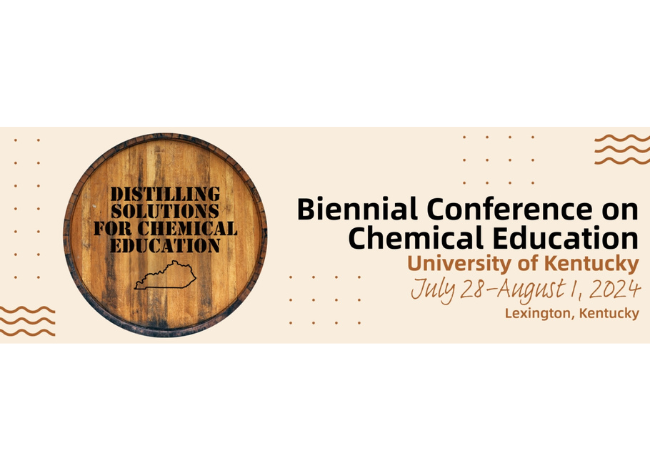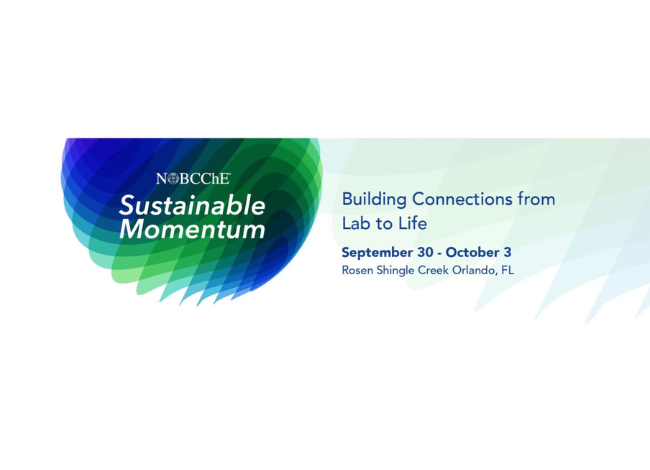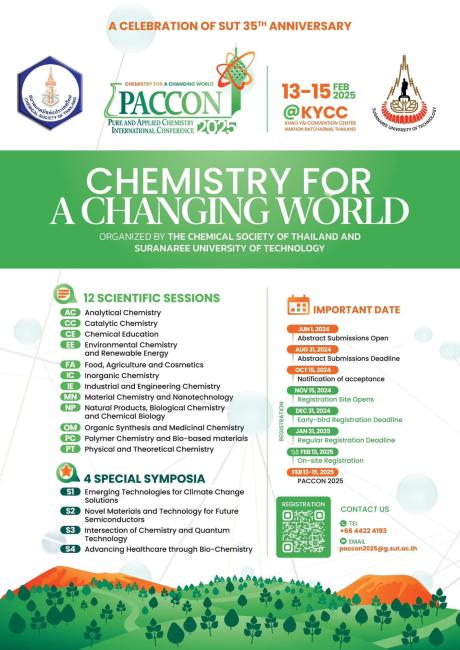The conference will be held on the beautiful campus of University of Kentucky in Lexington, Kentucky in the Summer of 2024. The 28th BCCE, like all of its predecessors, is designed to provide you with opportunities for interacting with chemistry instructors of all levels in formal and informal settings. There will be a mixture of symposia, workshops, poster sessions, exhibits, and tours of chemistry research areas.
Registration for BCCE 2024 is now live. Early bird pricing is available until May 31! The registration form includes workshops, on-campus housing options, and more. Those who have submitted abstracts will be notified in April about their submission.
The conference will be organized around four themes - Classroom Practice and Learning Environments, Curriculum and Cognition, Assessment and Research Methods, and Professional Development - within the K-12, two-year college, and university communities.
Instructions for presenters are available.
Connect with attendees and stay up to date with the conference on the GCTLC's BCCE 2024 forum thread!
Sunday
Workshop: Introduction to Integrating Green Chemistry and Sustainability in Undergraduate Teaching Laboratories
8:30am - 11:45am
Chaired by: John De Backere (University of Toronto)
Authors: Jonathon Moir, John De Backere, David Laviska, Jane Wissinger
Green Chemistry is a framework that helps “minimize or eliminate the use or generation of hazardous substances” in chemical processes and products. It is our responsibility as instructors to educate our students with respect to green chemistry, sustainability, and environmental issues to prepare them as future members of the workforce and agents of change in the world. Importantly, this has recently been recognized in the new ACS Guidelines for Bachelor's Degree Programs as a critical requirement, whereby curricula must provide students with a working knowledge of the Twelve Principles of Green Chemistry.
This interactive half-day (3h) workshop is aimed towards laboratory instructors at two- and four-year undergraduate institutions teaching curricula in all areas of specialization. We will illustrate the connection between fundamental principles of green chemistry, safety, and traditional teaching laboratory protocols (further examples provided in the accompanying symposium, see below for details). Participants will gain an understanding of not only practical aspects of greening undergraduate labs, but also ways of modifying assessments and content to improve pedagogical aspects of laboratory learning to include more topics around green chemistry and broader sustainability concepts. Participants will then divide into small sub-discipline specific groups to share experiments currently used in their courses, and discuss possible modifications to their own lab manuals to make them “greener”. After reflecting on current curricula, we will explore a number of useful resources for integrating theory into practice, such as the new online Green Chemistry Teaching and Learning Community (GCTLC). The workshop will conclude by creating personal action plans for implementing sustainable changes, both practically and pedagogically, to current experiments or potentially new experiments to be developed.
This workshop complements the symposium entitled “Frontiers in Integrating Green Chemistry and Sustainability into the Teaching Laboratory”, which will provide recent examples of "greener" teaching experiments.
Monday
Poster: Addressing the knowledge gap through professional education initiatives for educators to promote the global integration of sustainable chemistry into curricula
6:00pm - 6:55pm
Presented By: Monica Nyansa
The design for sustainable solutions to global challenges creates a critical need to develop a future workforce proficient in practicing and teaching the principles of sustainable chemistry. This entails equipping present and future scientists with the requisite skills in green chemistry and sustainability. The American Chemical Society (ACS) recently updated its Guidelines for Bachelor’s Degree Programs to incorporate green chemistry and sustainability into the learning outcomes as a normal expectation for coursework in ACS-approved degree programs.
Beyond Benign, an educational nonprofit that is a prominent advocate for green chemistry education worldwide plays a pivotal role in supporting the integration of green chemistry and sustainable practices into the chemistry curriculum. This support extends to the development and dissemination of curricular materials and resources created directly with educators and strategic partners through their Green Chemistry Commitment (GCC) and the Green Chemistry Teaching and Learning Community (GCTLC) platform. Another way Beyond Benign supports this endeavor is through the exploration of professional educational opportunities, empowering educators to integrate green chemistry and sustainability principles into the chemistry curriculum effectively, thus nurturing the next generation of scientists adept at addressing global challenges through sustainable chemistry practices.
This presentation aims to highlight the ongoing efforts of Beyond Benign, a champion of green chemistry education, to explore professional educational opportunities for educators, facilitating the integration of green and sustainable chemistry into the chemistry curriculum for a sustainable future.
Tuesday
Green Chemistry Education: Empowering the Global Community
in S60: Promoting Global Collaboration in Chemistry Education: Insights from International Initiatives |8:30am - 10:00am
Talk Presented By: Amy Cannon
The field of chemistry, providing the molecular building blocks of materials and products used throughout society, has a critical and foundational role in addressing the Sustainable Development Goals outlined by the United Nations. Green chemistry, the use and design of less hazardous chemical products, is essential in providing solutions in order to achieve these ambitious goals. As the global demand for greener, more sustainable chemicals and materials grows, the chemistry education system must shift in order to meet this demand. Green chemistry education is required to train scientists and professionals with the skills to address hazards and mitigate impacts at the earliest stages of the product lifecycle. Beyond Benign, a non-profit organization based in the USA, has been leading green educational initiatives aimed at empowering educators to change chemistry education for a sustainable future. As the organization has grown, so has the outreach and engagement with the global chemistry education community. With specific goals to scale the adoption of green chemistry within higher education systems globally, this presentation will share Beyond Benign’s approach to building community and engaging educators, empowering them to be transformative change agents. Specifically, the Green Chemistry Commitment (GCC) program, an institutional commitment towards including green chemistry in college level chemistry programs, and the Green Chemistry Teaching and Learning Community (GCTLC), an on-line platform supporting educators on their journeys, will be highlighted. Each program aims to build upon work in North America and authentically engage and empower the global community to adopt green chemistry in their teaching and practice.
Development of an open-access, community-driven, peer-reviewed library of green chemistry educational materials in Drupal 10: The Green Chemistry Teaching and Learning Community (GCTLC)
in S233: Computers in Chemical Education | 10:15am - 11:45 am
Talk Presented By: Jonathon Moir
The Green Chemistry Teaching and Learning Community (GCTLC) is a virtual space for higher education faculty and lecturers as well as K-12 teachers to find and share resources, participate in peer-to-peer learning, and connect and network with other users from around the world. The mission of the GCTLC is to help advance the integration of green chemistry across education systems worldwide to help train the next generation of scientists and workers with the knowledge and skills to address sustainability challenges across the globe. The platform allows users to connect with others through forums, group spaces, events, a job board, and more. Of particular note is the GCTLC’s open-access, peer-reviewed and community-driven library of over 190 curriculum resources. These include greener lab experiments, course modules, lecture slides, assessments and exams, journal articles, and more. Users can browse the existing collections via searching based on keyword terms, by contributor, by title, or by other filters, and can submit their own original work to the library or submit existing resources found elsewhere on the internet. Submitted resources undergo a simplified peer review process, managed by the GCTLC’s Chief Editor, and upon acceptance are published in the GCTLC’s searchable library (and, if warranted, added to new or existing curated collections on the platform). This presentation will overview the development and management of the GCTLC’s library and peer-review system using Drupal 10, including use of taxonomy terms, moderation states and workflows, and dynamic content displays. Ultimately this presentation will showcase the utility of open-source programming in creating inclusive spaces for educational communities of practice.
B19: Green Chemistry Teaching and Learning Community (GCTLC) Get-Together and Share-a-thon
1:00pm - 1:45pm
Chaired By: Jonathon Moir and Nimrat Obhi
This Birds of a Feather is a chance to come learn about the GCTLC and meet other GCTLC users (in-person!) from around the world. After some informal socializing, Beyond Benign's team members will walk through the basics of the GCTLC platform and jump into a group sharing session including an in-person resource upload (hackathon style)! We ask all attendees to bring their personal laptops to participate in the share-a-thon!
Attendees may ask for a "to go" container for their lunch from Champions Kitchen and bring it with you to the Birds of a Feather session.
Fostering a sense of belonging on the Green Chemistry Teaching and Learning Community (GCTLC) online platform
in S98: Effective Approaches to Inclusive Chemistry Education | 2:00 pm - 3:30 pm
Talk Presented by: Nimrat Obhi
Green chemistry education is essential in helping chemists and people with chemistry training to achieve global sustainability targets such as the United Nations Sustainable Development Goals. Inclusive communities of practice are needed to foster and facilitate transformative change in chemistry education for widespread knowledge and adoption of green chemistry. Beyond Benign – a non-profit organization advocating for global green chemistry education – has created the Green Chemistry Teaching and Learning Community (GCTLC), a free online platform that is the meeting place for a global green chemistry education community of practice. The GCTLC offers community-driven spaces and peer-to-peer mentoring, access to a searchable library of open-access green chemistry educational resources, an events calendar, a job board, and more.
Ensuring the GCTLC is and remains an inclusive community of practice for green chemistry educators involves interweaving diversity, equity, belonging, and respect principles throughout the entire development and sustenance of the platform. This presentation will outline our efforts to design an online space prioritizing educators’ feelings of belonging, community, and growth. We will discuss drafting a Code of Conduct for the platform, creating equitable and accessible community spaces, finding open-access resources for educators that include methods to decolonize and diversify green chemistry, running global community events, and creating an inclusive community engagement strategy for all users. Ultimately, we will discuss using open-access online platforms to strengthen a pipeline of green chemistry practitioners who are empowered to transform chemistry education.
Wednesday
B24: Green Chemistry Commitment (GCC) Program: Lunch and Learn about Professional Development and Grants
12:00pm - 12:45pm
Chaired By: Amy Cannon, Monica Nyansa
Join Beyond Benign staff and faculty from Green Chemistry Commitment (GCC) institutions for sharing green chemistry education best practices and networking over lunch. This session is open to all who are interested in incorporating green chemistry into their curriculum or interested in learning more about Beyond Benign’s Green Chemistry Commitment program and/or the Green Chemistry Teaching and Learning Community (GCTLC) online platform. Attendees will learn about the new benefits of the GCC program, including the GCTLC platform, green chemistry education challenge awards, and free on-demand professional development in green chemistry and toxicology for signing institution members to access through the GCC program only but open to all at a sustainable cost.
Attendees may ask for a "to go" container for their lunch from Champions Kitchen and bring it with you to the Birds of a Feather session.
S31: Current Research on the Undergraduate Chemistry Laboratory
Chaired by: Nikita Burrows (Monmouth University) , Monica Nyansa (Michigan Technological University, Beyond Benign) , Mary Ross (Central College)
This symposium will focus on current qualitative and quantitative research related to the undergraduate chemistry laboratory curriculum. Contributed papers should address research related to any aspect of the undergraduate laboratory. This includes, but is not limited to, general chemistry, organic chemistry, biochemistry, instructors, students, laboratory curriculum, pre-laboratory assignments, laboratory assessments, cognitive, affective or psychomotor factors, etc. Related research on laboratory design for exploring student’s engagement in chemistry laboratory may also be addressed.
Two-Day Symposium: Integrating Green Chemistry and Sustainability into Chemistry Education
Chaired By: Loyd Bastin (Widener University), and David Laviska (ACS Green Chemistry Institute)
This symposium will highlight the incorporation of green chemistry and sustainability principles throughout the chemistry curriculum as well as through co-curricular activities such as clubs, organizations and service-learning opportunities. The focus will be on green chemistry and sustainability materials and models rooted in the Twelve Principles of Green Chemistry that are designed to educate high school, community college, four year college and graduate students. These materials will include classroom teaching modules/courses, learning methods, educational research, laboratory experiments and experiences, the integration of toxicology into the chemistry curriculum, and the use of systems-thinking.








